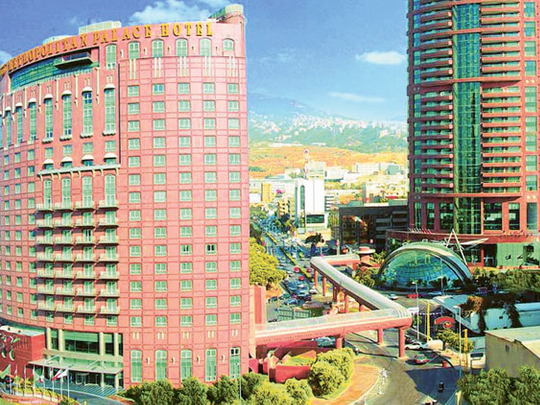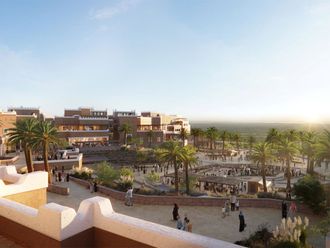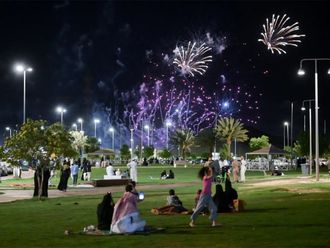
Dubai: Hilton Worldwide is currently in talks with Al Habtoor Group for a number of hotel projects in Dubai, according to a senior executive at the US-based group.
Al Habtoor earlier this year said it would demolish one of Dubai's oldest hotels — the Metropolitan — to redevelop the area as a tourism complex under a plan that will cost an estimated $1.3 billion.
"We are in discussions with Al Habtoor Group for elements of that project as it's a massive one. Undoubtedly, we will be interested in pursuing the hotel elements of that, but nothing has been signed up as yet," Ian Carter, Hilton Worldwide's president for global operations, told Gulf News in an interview.
The Al Habtoor Group, which owns and operates four hotels in Dubai, has been aggressively ramping up its hotels business. It recently signed management agreements with Hilton to develop the 324-room Waldorf Astoria Dubai Palm Jumeirah, scheduled to open at the end of 2013, and to convert two of its hotels in Beirut to the Hilton Hotels & Resorts brand.
Great additions
"The two hotels in Beirut will become Hiltons at the end of this month. They are going to be a great addition to our network. And this is our first experience of working together with the Dubai-based group," said Carter.
Hilton is also in discussions for more projects on the Palm Jumeirah. When asked for details, Carter told Gulf News: "We are not planning but in discussions. There is nothing that I could say, yes, this is specifically a project that we are going to do. But we are always looking for opportunities where we think we can deliver a great hotel and guest experience and The Palm would be included."
Asked if the future projects would fall in the luxury segment, Carter said: "In luxury, but not necessarily on The Palm. More luxury in Dubai for us is definitely an area we are targeting.
"And we do believe that there is a fit for more luxury hotels here in the right locations."
Commenting on whether the luxury segment is saturated, Carter said: "I think the reality is that it's not. What was key to Dubai being successful with all the luxury inventory stock is maintaining the attraction of the affluent visitor — which is done, and having great airline routes into and out of the country — which Emirates airline has done a fabulous job of [expanding its route network]."
Strong pipeline
With a strong pipeline planned for the Middle East, Hilton is bullish about doubling its portfolio in the region.
"We will double our trading estate in the Middle East — including Egypt and Africa, in the next four to five years," Carter said.
"Our pipeline for the Middle East has never been stronger," he added, without divulging numbers.
"We don't release the individual market numbers for the simple reason that our competitors would love to know. But what I can say is that our global pipeline has never been stronger. And as a region, if we look at just the Middle East, we have never been in a stronger position from a pipeline perspective," said a confident Carter.
He was quick to add that the availability of capital remains the biggest challenge to growth.
"That's not a decision we make, as obviously we work with partners because we just manage or franchise hotels to our partners that we work with. So access to capital in order to build is going to be key for any region in the world, and Dubai would be no different," said Carter.
He added that Hilton is looking at a number of other opportunities in Dubai, with the company's "most important hotel" due to open in the third quarter of this year — the Conrad on Shaikh Zayed Road — a business hotel with leisure components.
"There is still plenty of opportunity in Dubai. We look at Abu Dhabi in the same way and it is developing at a rapid pace," said Carter. In one to two years, Hilton expects to be fully present in the UAE market with its other products targeting the mid-scale segment.
As of now, the company is represented in this market only by its Hilton brand, but Conrad, Waldorf Astoria and DoubleTree by Hilton are expected to join the portfolio soon.
Global revenue
The Middle East accounts for less than 10 per cent of Hilton's global revenue at present, according to Carter.
"So it's not a significant portion of our overall revenue. However, it's disproportionately important because of a few reasons such as a number of benchmark projects having occurred in this region over time, such as the Burj Khalifa and the Emirates Palace recently. So while it may be a small percentage of our total revenues [coming out of this region], it is an important one," he said.
Commenting on the escalating tariffs in Dubai hotels, Carter said he also expects room rates to increase this year.
"I see room rates in Dubai hotels increasing by around 8-12 per cent this year. The market has got off to a good start and it probably will recover still further this year," said Carter.












